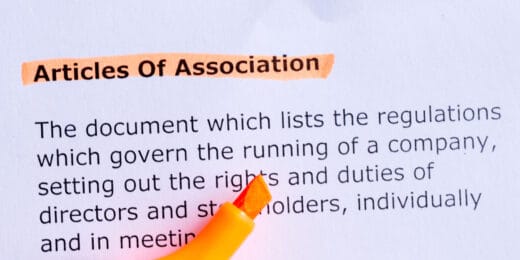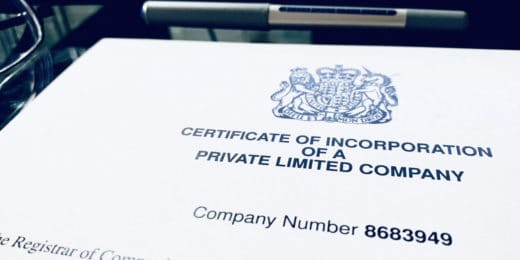The company registration process in the UK is relatively straightforward, but it’s easy to make mistakes that may cause your application to be rejected or require correction after incorporation. Based on our extensive experience and information obtained from Companies House, this blog reveals the most common errors and how you can avoid making these company formation mistakes.
Key Takeaways
- Ensure your company name is unique and compliant with trademark regulations to avoid registration delays.
- Always provide full names for directors and shareholders to prevent application rejections due to incomplete information.
- Choose the correct articles of association tailored to your company type to ensure smooth incorporation.
Most common company registration mistakes
To successfully register a limited company, attention to detail is paramount. It’s important to carefully consider certain decisions, take your time throughout the company formation process, and double-check all of the information on the application form before sending it to Companies House. These simple measures will significantly reduce the risk of making mistakes when registering a limited company.
The most common company registration mistakes are:
1. Choosing a company name that is already in use
Aside from having the power to make or break your business, your company name must comply with certain rules and restrictions. Before you start the company registration process, you must check that your company name is available to register.
If it is identical or very similar to the name of an existing company, you cannot use it. It’s also important to check that your proposed company name is not registered as a trademark.
Companies House provides guidance on company name rules and restrictions, including ‘sensitive’ words, so please review this before completing your application form.
2. Not providing supporting documentation for sensitive words
When used in company names, certain words and expressions are considered ‘sensitive’. To include any ‘sensitive’ words or expressions, you must provide supporting documentation from the necessary body with your company registration application. For example, if you want to form a company with the word ‘Bank’, you will need written permission from the Financial Conduct Authority.
3. Setting up the wrong type of company
The most popular types of companies are limited by shares and limited by guarantee. Changing the legal structure of a business can be a complex and costly affair after company formation, so it is important to understand the differences between these types of companies to ensure that you choose the most appropriate one for your needs.
4. Inconsistencies and spelling mistakes
Something as simple as a typo or inconsistent spelling of names or words will cause your application to be rejected. Whether you misspell your nationality or hit the wrong key when entering your company name, the anomaly will be picked up by Companies House.
Some errors, such as misspelling the name of a director or providing the wrong date of birth, won’t cause your application to be rejected because Companies House has no way of knowing that a mistake has been made. However, you will have to correct these details after incorporation to ensure that the information on the public record is accurate.
5. Providing initials instead of full names
When entering the names of officers (directors and company secretaries), subscribers (shareholders or guarantors), and People with Significant Control (PSCs), you must enter each individual’s full name, not their initials, e.g. John Smith, rather than J Smith.
6. Providing an unsuitable registered office address
The location of your company’s registered office (RO) address must correspond with your chosen country of incorporation:
- Incorporated in England & Wales – RO must be situated in England or Wales
- Incorporated in Wales only – RO must be situated in Wales
- Incorporated in Scotland – RO must be situated in Scotland
- Incorporated in Northern Ireland – RO must be situated in N. Ireland
The address used as your registered office must also be a physical postal address (as opposed to a PO Box number) that can be verified through Royal Mail’s Postcode and Address Finder.
7. Adopting the wrong articles of association
Most companies adopt Model articles of association at incorporation, a default set of articles Companies House provides. There are three versions of Model articles – one for private companies limited by shares, one for private companies limited by guarantee, and one for PLCs. If you select the wrong one for your company type, your application will be rejected.
Model articles will not be suitable if you want to deviate from any of the standard provisions, including issuing multiple types of shares. In such instances, you must alter the Model articles accordingly or create bespoke articles.
Your application will not be approved if you do not select Model articles or indicate that you wish to adopt altered or bespoke articles (and include a copy).
8. Appointing an ineligible company director
You cannot appoint a company director under the age of 16, an undischarged bankrupt, or a disqualified director. If you do, Companies House will reject your application.
9. Issuing too many shares
Shares represent how much of a company is owned and controlled by each shareholder, as well as the percentage of profits they’re entitled to receive. Shares also determine the extent of each shareholder’s liability for the business’s debts if it fails. Therefore, it’s important to:
- issue the appropriate number of shares to each individual based on their investment, profit entitlement, and/or level of control
- avoid issuing too many shares when there is no justifiable reason to do so
10. Providing unsuitable share information
If you wish to register a company limited by shares, you must complete a Statement of Capital with information about shares. The details you must provide include:
- Class (type) of shares
- Number of shares
- Nominal value of shares
- Currency of shares
- Prescribed particulars (‘rights’) attached to shares
If you do not provide all of this information and/or the share details entered do not comply with the provisions in your chosen articles of association, Companies House will not approve your application.
Avoid company registration mistakes by setting up a company online
Online company registration is by far the most popular, efficient, and successful method of incorporation in the UK. According to Companies House, 99% of companies are now registered online.
Due to built-in checks and validation that help users avoid errors, less than 10% of electronic applications are rejected, compared to more than 50% of paper/postal applications.
The risk of making mistakes when registering a limited company online is further reduced if you use the services of a company formation agent.
At Rapid Formations, each application is carefully checked for errors and anomalies that may slip through the built-in checks. This additional level of review significantly minimises instances of company registration mistakes and rejected applications.
Please note that the information provided in this article is for general informational purposes only and does not constitute legal, tax, or professional advice. While our aim is that the content is accurate and up to date, it should not be relied upon as a substitute for tailored advice from qualified professionals. We strongly recommend that you seek independent legal and tax advice specific to your circumstances before acting on any information contained in this article. We accept no responsibility or liability for any loss or damage that may result from your reliance on the information provided in this article. Use of the information contained in this article is entirely at your own risk.










Join The Discussion